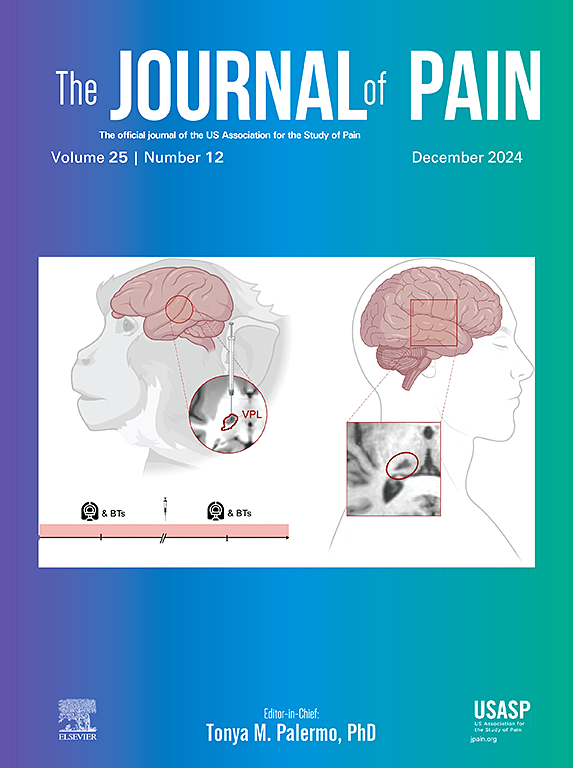重新考虑减肥在慢性疼痛治疗中的作用:以膝关节骨性关节炎为例。
IF 4
2区 医学
Q1 CLINICAL NEUROLOGY
引用次数: 0
摘要
慢性疼痛在体重较重的人中很普遍,并与更大的损伤有关。因此,体重减轻是体重较重人群疼痛治疗的常见建议。体重是一个很有吸引力的目标,因为它是可以改变的,而且以证据为基础的减肥治疗方法已得到广泛认可。在过去的二十年里,越来越多的科学研究开始研究如何将减肥应用于慢性疼痛患者。这是整合疼痛和体重概念的重要一步,有初步研究表明,当减肥治疗与疼痛应对技巧相结合时,治疗效果会增强。然而,减肥的结果是多变的,而且难以持续,获得循证治疗的途径也很有限。公众和学术界日益关注以体重为中心的医疗保健方法,而这种方法在西方医学中占据主导地位,在这种背景下,这些问题就显得尤为突出。现在正是重新考虑体重与疼痛的概念以及减肥在慢性疼痛治疗中的作用的好时机。我们以骨关节炎为例,回顾了减肥作为慢性疼痛治疗策略的证据和临床应用情况,最后提出了需要考虑的关键领域,以促进科学界对这些并发症的理解,以及如何优化体重较重人群的疼痛治疗。观点:这篇重点文章批判性地探讨了减肥在体重较重人群慢性疼痛管理中的作用。文章以膝关节骨性关节炎为例,回顾了减肥治疗疼痛的证据和临床应用情况。同时还考虑了其局限性,以指导未来的研究和临床治疗。本文章由计算机程序翻译,如有差异,请以英文原文为准。
Reconsidering the Role of Weight Loss in Treatment for Chronic Pain: Knee Osteoarthritis as an Exemplar
Chronic pain is prevalent among individuals with higher body weight and associated with greater impairment. As a result, weight loss is a common recommendation for pain management among those with higher body weight. Body weight is an appealing target because it is modifiable and evidence-based treatments to produce weight loss are well-established. In the last 2 decades, there has been a growing line of scientific work investigating the application of weight loss to individuals with chronic pain. This represents an important step to integrate the conceptualization of pain and body weight and there is preliminary work suggesting treatment effects are enhanced when weight loss treatment is combined with pain coping skills. However, weight loss outcomes are variable and difficult to sustain, and access to evidence-based treatment is limited. These concerns are set against the backdrop of growing public and academic concern about the weight-centric approach to health care that dominates western medicine. This is a timely moment to reconsider the conceptualization of weight and pain, and the role of weight loss in chronic pain treatment. Using osteoarthritis as an exemplar, we review the evidence for and clinical uptake of weight loss as a chronic pain management strategy and conclude with key areas for consideration to advance the scientific understanding of these comorbid conditions and how to optimize pain management for individuals of higher body weight.
Perspective
This focus article critically considers the role of weight loss in management of chronic pain among individuals of higher body. Using knee osteoarthritis as an exemplar, the evidence and clinical uptake of weight loss for pain management is reviewed. Limitations are considered to guide future research and clinical care.
求助全文
通过发布文献求助,成功后即可免费获取论文全文。
去求助
来源期刊

Journal of Pain
医学-临床神经学
CiteScore
6.30
自引率
7.50%
发文量
441
审稿时长
42 days
期刊介绍:
The Journal of Pain publishes original articles related to all aspects of pain, including clinical and basic research, patient care, education, and health policy. Articles selected for publication in the Journal are most commonly reports of original clinical research or reports of original basic research. In addition, invited critical reviews, including meta analyses of drugs for pain management, invited commentaries on reviews, and exceptional case studies are published in the Journal. The mission of the Journal is to improve the care of patients in pain by providing a forum for clinical researchers, basic scientists, clinicians, and other health professionals to publish original research.
 求助内容:
求助内容: 应助结果提醒方式:
应助结果提醒方式:


